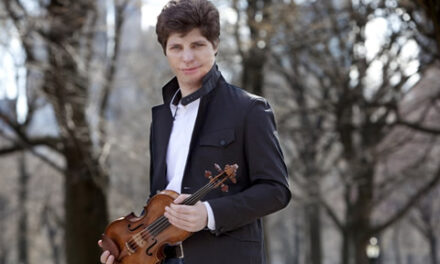The recital by bass-baritone Jean-Ronald LaFond, listed in our Calendar under the title “Art Songs of the Caribbean,” originally scheduled for 8 p.m. on April 14 and postponed to April 28 at 8:30 (odd hour!), caught my eye and piqued my curiosity, so I made the trek to the A.J. Fletcher Recital Hall at ECU in Greenville on the latter date. The trip will become considerably easier and quicker once the Wilson bypass is completed, and Triangle residents might well want to begin paying more attention to the interesting fare offered there, both by the fine department of music and on the performing arts series. Regular readers will recall that I went down for a presentation of Japanese music and dance earlier this year (see the February review archives). This evening’s audience of 50-60 was composed almost exclusively of students and a few faculty.
The program presented (the title of this review) was different from what I had anticipated but not disappointing, nonetheless. LaFond revealed in his comments after the first song that the selection of works was the result of a personal quest to prepare a program drawing on his heritage and to understand the meaning of “Latin-American” as used here in the USA in relation to its usage in his native Haïti. There, it is inclusive of all countries outside of North America (i.e., the USA and Canada), but here it seems to mean only Spanish-speaking ones plus Brazil, with the islands largely forgotten. This led him to some additional reflections and comments on inclusiveness and exclusiveness when introducing the encore at the end of the evening, which he said he’s close to adopting as his “hymn.”
The sixteen songs by thirteen different composers were grouped in sets of four from 1) Spanish South America, 2) Brazil, 3) The Caribbean, and 4) Central America. Although a few were familiar, many of these works and their composers were totally unknown to me. I had heard of Argentinean Carlos Guastavino, but not of Colombian Jaime Leon, Venezuelan Juan Plaza, or Chilean Juan Orrego-Salas, for example, in spite of the latter’s having founded the Latin American Music Center at Indiana University. Everyone knows Villa-Lobos, but who knows his compatriots Claudio Santoro and Mozart Camargo Guarnieri? (A recent CD entitled Modinha , featuring soprano Maria José Montiel and pianist Luiz de Moura Castro, includes some songs by Santoro.) Puerto Rican Ernesto Cordero’s name is known to guitarists, but Haitian Carmen Brouard is unknown outside her homeland. Even if they are not household names, Mexicans Carlos Chavez and Silvestre Revueltas are known, but certainly not Guatemalans Salvador Ley and Miguel Sandoval. The encore was “Por amor” by yet a fourteenth composer, Dominican Manuel Troncosa, an arrangement by LaFond of a popular song, mis-attributed to someone else in the book in which he found it in print, he revealed.
Fortunately, the excellent notes interspersed between the texts of the songs and their English translations in the accompanying handout filled the listeners in on basic biographical details for the composers. This handout was obviously prepared by the artist but was not directly credited, and it did not provide any biographical information about him or his able collaborator at the piano, Catherine Hanna, it apparently being assumed that only those who knew them and their backgrounds would come out. From his comments, I gleaned that he has been at ECU for two years, and that he lived in Manhattan at some point, and I recalled that he had sung a role in Long Leaf Opera’s production of Menotti’s The Consul , presented in Durham’s Carolina Theatre last fall. He is a native speaker of French, has also learned Spanish, and handles English well, although he clearly doesn’t yet think in that language when speaking (or writing) it. With the exception of Lorca, the poets responsible for the texts of the songs were also not credited.
Unfortunately, because much of the music is inspired by folk melodies and dance rhythms, the program did not contain a wide variety of styles, although there were a variety of emotions expressed and they were rendered well. LaFond has a large voice and a lot of personality; he threw in some dance steps along with one song. Diction was good and enunciation clear in all three languages, with the Portuguese being just a hair weaker than the French and Spanish. This was not your standard art song recital, and it, as well as making the acquaintance of the material, were well worth the trip. I’d enjoy hearing a broader example of LaFond’s abilities in his next recital outing on the stage.












